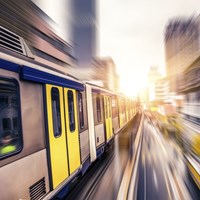
- Record long distance passenger numbers
- EBIT up 10.6% to EUR 1.95 billion
- New record in train path kilometers on the German rail network
- Further growth at DB Arriva and DB Schenker
With a new long distance passenger record and a jump in profits, Deutsche Bahn (DB) returned to a path of success in the 2016 fiscal year. The company boosted long distance patronage once again, transporting 7.1 million (5.4%) more passengers year on year, or a total of 139 million. In addition, substantial improvements to the punctuality of DB's long distance services (up 4.5 percentage points) were accompanied by an increase in customer satisfaction.
"Our Zukunft Bahn program is all about quality, and we are seeing the effects of our work to raise punctuality, improve cleanliness and offer our passengers better travel information," said Dr. Richard Lutz, the new DB CEO. "What is more, adjusted earnings before interest and taxes (EBIT) not only exceeded our target, but also rose more than 10% year on year, to over EUR 1.9 billion. We also continued to generate growth at our international businesses. 2016 was a good year for Deutsche Bahn."
Revenues at DB rose by EUR 108 million (0.3%) in 2016, to EUR 40.6 billion. Adjusted earnings before interest and taxes (EBIT) were up EUR 187 million (10.6%), to EUR 1.95 billion. Gross capital expenditure rose by EUR 166 million (1.8%) to EUR 9.5 billion. Net financial debt saw only a slight increase of EUR 133 million (0.8%) in the 2016 fiscal year, to EUR 17.6 billion. The increase remained low due to the exchange rate with the pound sterling, and in particular to capital expenditures which were originally planned for 2016 but will not actually be reflected on the books until this year.
Transport
A total of 4.4 billion people used Deutsche Bahn's trains and buses in Europe in 2016, a year-on-year increase of 81 million (1.9%). Rail passenger transport in Germany saw an increase in passenger numbers of 7 million, to more than 2 billion, with long distance patronage up and regional patronage constant. DB Arriva boosted its passenger numbers by 98 million (5.9%) to 1.76 billion in 2016, due in part to its successful bids for major franchises in the UK and the Netherlands. It also raised its share in the UK rail transport market from 14% to a full 23%.
Metric ton kilometers in rail freight transport fell by 3.8% year on year, to 94.7 billion. DB Cargo has put in place a comprehensive blueprint for realignment and is currently working to return to a path of lasting success.
Infrastructure
As rail traffic rose in 2016, so did volume produced on the DB rail network – by 1.3% to a new record of 1.07 billion train path kilometers. Non-DB rail companies increased their share once again, to a new high of 30%. In light of these increases, the number of stops at DB passenger stations also rose, by 1.1%, with non-DB companies accounting for 35.3% (up 12.4% year on year).
Freight forwarding and logistics
DB Schenker saw positive performance across the board, with the number of European land transport consignments up 0.3% and air freight volumes up 4.5%. Ocean freight volumes rose 3.3%, and revenues at contract logistics rose 7%.
About Deutsche Bahn
Deutsche Bahn is a leading mobility and logistics company with outstanding competences in operation and development of traffic networks.
We permanently promote mobility and logistics locally, nationally and internationally, as integrated group with railservice as our core business.
Our core competences are:
- Efficient and reliable operation of traffic networks
- End-to-End offers of mobility and logistics services
- Long lasting cooperative partnership with public authorities
- Intelligent connection of traffic networks
The target is to reach our vision of being the world leading mobility and the logistics company with our core competences and service offers in public transports (mobility for people – national and international), infrastructure (efficient and sustainable rail infrastructure in Germany) and transport and logistics (intelligent logistics services for land, sea and air). Sustainability, economic efficiency, customer orientation and progressiveness are the core elements of our strategy. Deutsche Bahn offers answers to globalization trends, climate change, scarcity of resources and deregulation today.




Comments
There are no comments yet for this item
Join the discussion